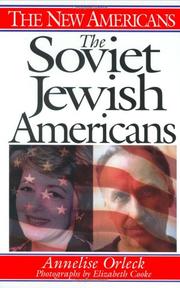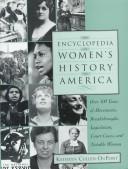| Listing 1 - 9 of 9 |
Sort by
|
Book
ISBN: 9780415811729 9780415811736 9780203069912 9781135089061 9781135089016 9781135089054 0203069919 0415811724 0415811732 Year: 2015 Volume: *4 Publisher: New York London Routledge
Abstract | Keywords | Export | Availability | Bookmark
 Loading...
Loading...Choose an application
- Reference Manager
- EndNote
- RefWorks (Direct export to RefWorks)
"In this enthralling narrative, Annelise Orleck chronicles the history of the American women's movement from the nineteenth century to the present. Starting with an incisive introduction that calls for a reconceptualization of American feminist history to encompass multiple streams of women's activism, she weaves the personal with the political, vividly evoking the events and people who participated in our era's most far-reaching social revolutions. In short, thematic chapters, Orleck enables readers to understand the impact of women's activism, and highlights how feminism has flourished through much of the past century within social movements that have too often been treated as completely separate. Showing that women's activism has taken many forms, has intersected with issues of class and race, and has continued during periods of backlash, Rethinking American Women's Activism is a perfect introduction to the subject for anyone interested in women's history and social movements"--
Feminism --- Women --- Women's rights --- Social movements --- History --- Political activity --- United States --- Social conditions --- Politics and government --- Feminism - United States - History --- Women - Political activity - United States - History --- Women's rights - United States - History --- Social movements - United States - History --- United States - Social conditions --- United States - Politics and government
Book
ISBN: 1469635933 1469635925 9781469635927 9781469635934 9781469635910 1469635917 9798890855190 Year: 2017 Publisher: Chapel Hill, North Carolina : The University of North Carolina Press,
Abstract | Keywords | Export | Availability | Bookmark
 Loading...
Loading...Choose an application
- Reference Manager
- EndNote
- RefWorks (Direct export to RefWorks)
Over twenty years after its initial publication, Annelise Orleck's Common Sense and a Little Fire continues to resonate with its harrowing story of activism, labor, and women's history. Orleck traces the personal and public lives of four immigrant women activists who left a lasting imprint on American politics. Though they have rarely made more than cameo appearances in previous histories, Rose Schneiderman, Fannia Cohn, Clara Lemlich Shavelson, and Pauline Newman played important roles in the emergence of organized labor, the New Deal welfare state, adult education, and the modern women's movement. Orleck takes her four subjects from turbulent, turn-of-the-century Eastern Europe to the radical ferment of New York's Lower East Side and the gaslit tenements where young workers studied together. Orleck paints a compelling picture of housewives' food and rent protests, of grim conditions in the garment shops, of factory-floor friendships that laid the basis for a mass uprising of young women garment workers, and of the impassioned rallies working women organized for suffrage. Featuring a new preface by the author, this new edition reasserts itself as a pivotal text in twentieth-century labor history.
Jewish women --- Political activity. --- Women, Jewish --- Women
Book
ISBN: 9780807081785 Year: 2018 Publisher: Beacon Press
Abstract | Keywords | Export | Availability | Bookmark
 Loading...
Loading...Choose an application
- Reference Manager
- EndNote
- RefWorks (Direct export to RefWorks)
Book
ISBN: 9780807081778 0807081779 Year: 2018 Publisher: Boston Beacon Press
Abstract | Keywords | Export | Availability | Bookmark
 Loading...
Loading...Choose an application
- Reference Manager
- EndNote
- RefWorks (Direct export to RefWorks)
"The story of low-wage workers rising up around the world to demand respect and a living wage. We Are All Fast Food Workers Now: The Global Uprising Against Poverty Wages traces the evolution of a new global labor movement sparked and sustained by low-wage workers from Manila to Manhattan, from Baja California to Bangladesh, from Capetown to Cambodia. This is an up close and personal look at globalization and its costs, as seen through the eyes and told whenever possible through the words of low-wage workers themselves: the berry pickers and small farmers, fast food servers, retail cashiers, garment workers, hotel housekeepers, home health care aides, airport workers and adjunct professors who are fighting for respect, safety and a living wage. The result of 140 interviews by award-winning historian Annelise Orleck, and with original photographs by Liz Cooke, this is a powerful look at neo-liberalism and its damages, a story of resistance and rebellion, a reflection on hope and change as it rises from the bottom up"--

ISBN: 0313300747 Year: 1999 Publisher: Westport, Conn. London Greenwood Press
Abstract | Keywords | Export | Availability | Bookmark
 Loading...
Loading...Choose an application
- Reference Manager
- EndNote
- RefWorks (Direct export to RefWorks)
Book
ISBN: 1283267918 9786613267917 0820341843 9780820341842 9781283267915 6613267910 0820331015 9780820331010 9780820331010 0820331015 9780820339498 0820339490 Year: 2011 Publisher: Athens University of Georgia Press
Abstract | Keywords | Export | Availability | Bookmark
 Loading...
Loading...Choose an application
- Reference Manager
- EndNote
- RefWorks (Direct export to RefWorks)
Poverty --- Economic assistance, Domestic --- Poor --- Community development --- Public welfare --- Government policy --- History --- Political activity

ISBN: 0816026254 Year: 1996 Publisher: New York Facts on File
Abstract | Keywords | Export | Availability | Bookmark
 Loading...
Loading...Choose an application
- Reference Manager
- EndNote
- RefWorks (Direct export to RefWorks)
Book

ISBN: 9780231887205 Year: 2001 Publisher: New York, NY
Abstract | Keywords | Export | Availability | Bookmark
 Loading...
Loading...Choose an application
- Reference Manager
- EndNote
- RefWorks (Direct export to RefWorks)
Book

ISBN: 9780231549585 023154958X 9780231191920 0231191928 Year: 2019 Publisher: New York, NY
Abstract | Keywords | Export | Availability | Bookmark
 Loading...
Loading...Choose an application
- Reference Manager
- EndNote
- RefWorks (Direct export to RefWorks)
From the founding of New Amsterdam until today, working people have helped create and re-create the City of New York through their struggles. Starting with artisans and slaves in colonial New York and ranging all the way to twenty-first-century gig-economy workers, this book tells the story of New York's labor history anew.City of Workers, City of Struggle brings together essays by leading historians of New York and a wealth of illustrations, offering rich descriptions of work, daily life, and political struggle. It recounts how workers have developed formal and informal groups not only to advance their own interests but also to pursue a vision of what the city should be like and whom it should be for. The book goes beyond the largely white, male wage workers in mainstream labor organizations who have dominated the history of labor movements to look at enslaved people, indentured servants, domestic workers, sex workers, day laborers, and others who have had to fight not only their masters and employers but also labor groups that often excluded them. Through their stories-how they fought for inclusion or developed their own ways to advance-it recenters labor history for contemporary struggles. City of Workers, City of Struggle offers the definitive account of the four-hundred-year history of efforts by New York workers to improve their lives and their communities.In association with the exhibition City of Workers, City of Struggle: How Labor Movements Changed New York at the Museum of the City of New York
E-books --- Labor unions --- Labor --- Labor and laboring classes --- Manpower --- Work --- Working class --- Industrial unions --- Labor, Organized --- Labor organizations --- Organized labor --- Trade-unions --- Unions, Labor --- Unions, Trade --- Working-men's associations --- Labor movement --- Societies --- Central labor councils --- Guilds --- Syndicalism --- History. --- History
| Listing 1 - 9 of 9 |
Sort by
|

 Search
Search Feedback
Feedback About UniCat
About UniCat  Help
Help News
News